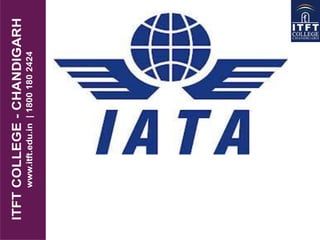
ITFT - IATA- International Air Transport Association
- 3. Introduction to iata • The International Air Transport Association is the trade association for the world’s airlines. • It represents some 240 airlines or more than 80% total air traffic.
- 4. headquarters • It is headquartered in Montreal, Canada with Executive Offices in Geneva, Switzerland.
- 5. Iata’s structure IATA is led by Tony Tyler Director General & CEO since July 2011.
- 6. Main offices • IATA has 63 offices in 61 countries, with its Head Office in Montreal, Executive Office in Geneva and Regional Offices in Amman, Beijing, Brussels, Johannesburg, Madrid, Miami, Moscow, Singapore and Washington. • The IATA Annual General Meeting & World Air Transport Summit, held in June each year,
- 8. FOUNDATION OF IATA • IATA was founded in Havana, Cuba, in April 1945. It is the prime vehicle for inter-airline cooperation in promoting safe, reliable, secure and economical air services - for the benefit of the world's consumers. The international scheduled air transport industry is more than 100 times larger than it was in 1945.
- 9. Foundation cont. • At its founding, IATA had 57 members from 31 nations, mostly in Europe and North America. Today it has some 240 members from 118 nations in every part of the globe. The modern IATA is the successor to the International Air Traffic Association founded in the Hague in 1919 - the year of the world's first international scheduled services.
- 10. THE EARLY DAYS • Immediately after 1945(after the end of world war 2) IATA had to handle world wide responsibilities with a more systematic organization and a large infrastructure.
- 11. mission TO REPRESENT TO LEAD TO SERVE THE AVIATION INDUSTRY
- 12. TO REPRESENT • Improve understanding of the air transport industry among decision makers and increase awareness of the benefits that aviation brings to national and global economies. • Advocating for the interests of airlines across the globe, we challenge unreasonable rules and charges, hold regulators and governments to account, and strive for sensible regulation.
- 13. TO LEAD • For nearly 70 years, we have developed global commercial standards upon which the air transport industry is built. Our aim is to assist airlines by simplifying processes and increasing passenger convenience while reducing costs and improving efficiency.
- 14. TO SERVE • We help airlines to operate safely, securely, efficiently, and economically under clearly defined rules. Professional support is provided to all industry stakeholders with a wide range of products and expert services.
- 15. MEMBERSHIP FORMAL MEMBERSHIP FORMAL IATA MEMEBERSHIP ONLY APPLIES TO AIRLINES. OTHER INDUSTRY PARTNERS CAN PARTICIPATE IN DIFFERENT IATA PROGRAMS & BENEFIT FROM A WEALTH OF RESOURCES TO CARRY OUT THEIR OPERATIONS
- 16. MEMBERS • AIRLINES • TRAVEL AGENCIES & OTHER TRAVEL AND TOURISM INTERMEDIARIES • FREIGHT FORWARDERS • INDUSTRY SUPPLIERS
- 17. TYPES OF IATA MEMBERSHIP • IATA Membership is open to both scheduled and non-scheduled airlines that maintain an IATA Operational Safety Audit (IOSA) registration. • Active Members • Associate Members • Allied Members
- 18. AIRLINES • IATA MEMBERSHIP IS OPEN TO BOTH SCHEDULED AND NON- SCHEDULED AIRLINES.
- 19. TRAVEL AGENCY AND OTHER TRAVEL INTERMEDIARIES • TRAVEL AND TOURISM ACCREDITATION AND CODE SERVICES SIMPLIFY THE BUSSINESS RELATIONSHIP BETWEEN AGENTS AND AIRLINES AS WELL AS OTHER TOURISM SERVICE PROVIDERS.
- 20. FREIGHT FORWARDERS • IATA PROVIDES ACCREDITATION PROVIDES INDUSTRY RECOGNITION FOR CARGO AGENTS.
- 21. INDUSTRY SUPPLIERS • IATA STRATEGIC PARTNERSHIPS PROGRAMS ALLOWS SUPPLIERS AND SERVICE PROVIDRERS TO INTERACT WITH IATA AND ITS MEMVER AIRLINES IN THE DEVELOPMENT TO INTERACT WITH IATA AND ITS MEMBER AIRLINES IN THE DEVELOPMENT OF INDUSTRY SOLUTION.
- 22. FUNCTIONS • Regulates airlines ‘rights’ on operations in a foreign country (with host govt. consent). • Regulates air tariffs. • Settles disputes between any two airlines. • Regulates complete accounting through their medium of BSP (Billing and Settlement Plan)
- 23. • Frames laws and by-laws on air transportation • Keeping in view geographical conditions and location. Provides professional training to manpower -both distance learning as well as classroom studies • Supports CRS providers. • Designates each airline with a two alpha code, each location with a three alpha code and each airline with a three numeric code.
- 24. • Updates the travel industry with latest developments and changes on regular basis through their web sites/email/newsletters etc. • Maintains high financial credibility. • Maintains high standards of quality in service. • Controls ticket stocks and distributes them to accredited travel industry. • Conducts meetings at regular intervals at all levels- international/regional/local and also invite participation from all members.
